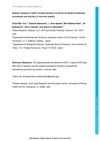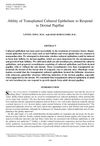 June 2023 in “Journal of cosmetic medicine”
June 2023 in “Journal of cosmetic medicine” Hair follicle stem cells and mitochondria are key for hair growth, and targeting their activity could lead to new hair loss treatments.
 154 citations,
November 2017 in “Development”
154 citations,
November 2017 in “Development” Fibroblast Growth Factors (FGFs) are important for tissue repair and regeneration, influencing cell behavior and other factors involved in healing, and are crucial in processes like wound healing, bone repair, and hair growth.
 131 citations,
July 2009 in “Experimental Dermatology”
131 citations,
July 2009 in “Experimental Dermatology” The document concludes that specific cells are essential for hair growth and more research is needed to understand how to maintain their hair-inducing properties.
 11 citations,
June 2017 in “Journal of cell science”
11 citations,
June 2017 in “Journal of cell science” AGD1's PH domain is essential for its role in root hair growth and polarity.
 February 2024 in “Journal of applied pharmaceutical research”
February 2024 in “Journal of applied pharmaceutical research” Herbal hair oils with Coconut, Curry leaves, Amla, Fenugreek, and Onion promote hair growth and are safe.
 27 citations,
January 2020 in “Experimental Dermatology”
27 citations,
January 2020 in “Experimental Dermatology” Immune cells affect hair growth and could lead to new hair loss treatments.
 January 2025 in “Nature Communications”
January 2025 in “Nature Communications” CPK1 helps root hair growth in Arabidopsis by activating channels for calcium signaling.
 169 citations,
September 2010 in “Molecular & cellular proteomics”
169 citations,
September 2010 in “Molecular & cellular proteomics” Pectin biosynthesis is essential for the growth of cotton fibers and Arabidopsis root hairs.
 18 citations,
June 1988 in “Culture, medicine and psychiatry”
18 citations,
June 1988 in “Culture, medicine and psychiatry” The perception of excessive hair growth in women as abnormal is more influenced by cultural norms than by medical reasons.
 17 citations,
April 2020 in “Dermatology and Therapy”
17 citations,
April 2020 in “Dermatology and Therapy” The PRP-like cosmetic product with postbiotics effectively treats hair loss in Alopecia areata.
 13 citations,
May 2005 in “Seminars in Plastic Surgery”
13 citations,
May 2005 in “Seminars in Plastic Surgery” Follicular Cell Implantation might become a new treatment for hair loss and could lead to advances in organ regeneration.
 1 citations,
March 2023 in “Applied sciences”
1 citations,
March 2023 in “Applied sciences” Lavender, lemongrass, rosemary, and chamomile essential oils may help protect cells important for hair growth from damage and could promote hair growth.
 January 2024 in “Biomaterials Research”
January 2024 in “Biomaterials Research” 3D-cultured cells in HGC-coated environments improve hair growth and skin integration.
Current hair regeneration methods show promise but face challenges in maintaining cell effectiveness and creating the right environment for hair growth.
 17 citations,
January 1997 in “Cell and Tissue Research”
17 citations,
January 1997 in “Cell and Tissue Research” Scientists developed a method to grow human fetal skin and digits in a lab for 3-4 weeks, which could help study skin features and understand genetic interactions in tissue formation.
 June 2023 in “Frontiers in Medicine”
June 2023 in “Frontiers in Medicine” Protein tyrosine kinases are key in male pattern baldness, affecting skin structure, hair growth, and immune responses.
 11 citations,
October 2001 in “Tissue engineering”
11 citations,
October 2001 in “Tissue engineering” Cultured epithelium can form hair follicles when combined with dermal papillae.
 December 2023 in “Frontiers in plant physiology”
December 2023 in “Frontiers in plant physiology” Root hairs are key for developing cereals that can fertilize themselves with nitrogen.
 12 citations,
January 2021 in “International Journal of Biological Sciences”
12 citations,
January 2021 in “International Journal of Biological Sciences” Scientists successfully edited a goat's genes to grow more and longer cashmere hair.
January 2022 in “Stem cell biology and regenerative medicine” Improving dermal papilla cells can help regenerate hair follicles.
 November 2024 in “The Journal of Cell Biology”
November 2024 in “The Journal of Cell Biology” Basement membrane changes are crucial for hair follicle development.
 41 citations,
March 1998 in “Archives of Dermatological Research”
41 citations,
March 1998 in “Archives of Dermatological Research” The enzyme that changes testosterone to a stronger form is mostly found in the part of the hair follicle called the dermal papilla.
 16 citations,
August 1992 in “Archives of dermatological research”
16 citations,
August 1992 in “Archives of dermatological research” Lab-grown nail cells show characteristics similar to natural nail and hair.
 36 citations,
May 2016 in “Biomaterials”
36 citations,
May 2016 in “Biomaterials” Endo-HSE helps grow hair-like structures from human skin cells in the lab.
 8 citations,
December 2018 in “Journal of Dermatological Treatment”
8 citations,
December 2018 in “Journal of Dermatological Treatment” The PRP-like cosmetic with biomimetic peptides is potentially effective and safe for treating alopecia areata.
 7 citations,
July 2018 in “International Journal of Applied Pharmaceutics”
7 citations,
July 2018 in “International Journal of Applied Pharmaceutics” Chitosan nanoparticles are promising for sustained caffeine delivery through the skin.
 June 2020 in “Aesthetic Surgery Journal”
June 2020 in “Aesthetic Surgery Journal” Estradiol-rich plasma can increase hair density faster and more effectively in male pattern baldness treatment than regular plasma.
18 citations,
February 2017 in “Molecular Medicine Reports” Activating Notch signaling can kill basal cell carcinoma cells.
1 citations,
November 2022 in “Journal of Investigative Dermatology” ALRN-6924 may prevent hair loss caused by chemotherapy.
 13 citations,
July 2022 in “Frontiers in cell and developmental biology”
13 citations,
July 2022 in “Frontiers in cell and developmental biology” Tiny natural vesicles from cells might help treat hair loss.


























